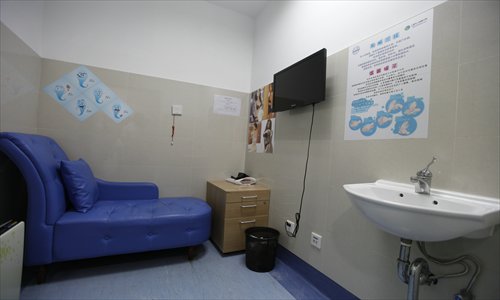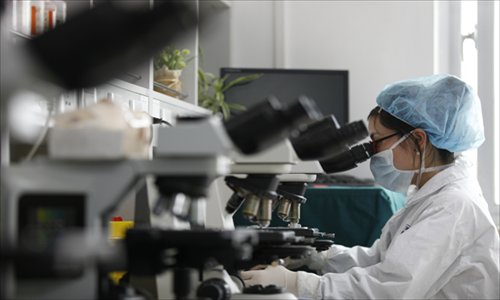Banking on men

One of the donor's private rooms at the Renji Hospital sperm bank. Photo: Cai Xianmin/GT
For many young men in Shanghai it sounds an ideal way of making money while enjoying themselves. The Shanghai Municipality Human Sperm Bank pays up to 5,000 yuan ($821) to donors and hundreds of hopefuls arrive at the bank every week.
They head to the northern branch of Renji Hospital on Lingshan Road where, on the third floor, they will find the reception desk and entrance decorated with cartoons of cheerful sperm.
But it's far from cartoon fun in reality. Li Zheng is the director of the Shanghai Municipality Human Sperm Bank and he said the bank had two big problems. "The quality of the sperm offered is not good and there are not enough suitable donors."
Of the thousands of volunteers the bank sees every year, only 15 percent qualify as donors and 10 percent of these men will drop out after being accepted.
Ten years after it was established there are only around 5,000 sperm donations being stored at Renji at present although several thousand women have been impregnated. It's even more problematic in other parts of China where sperm banks only hold a tenth of this number of donations.
In 1988, China's first sperm bank was founded in Hunan Province. In 2003, the then Ministry of Health of China formally approved that the Shanghai sperm bank be established in Renji Hospital. Of the 17 sperm banks in China the Shanghai bank is one of the most successful, handling the most cases and having the best record for research.

A sperm bank doctor analyses a sample in the Renji Hospital laboratory. Photo: Cai Xianmin/GT
Donors wanted
Liu Yong is the senior technical officer with the sperm bank and told the Global Times that the bank tried to attract donors by sending out brochures to universities and posting information on social media websites. "Although donating sperm is an altruistic thing, under the Ministry of Health regulations we are not allowed to advertise."
Liu said college students had more free time and more flexible schedules than most people so it was more likely they would be able to be valid donors. But the bank's promotional attempts often met with obstacles and opposition which he blamed on traditional Chinese conservatism.
Chen Kai, a senior college student told the Global Times, he had seen the recruitment posters in the university as well on Renren (the most popular Chinese college student social networking website) several times. He once called the bank out of curiosity but when the complex donation procedure was explained he hung up from shyness.
"We get dozens of calls every day," said Du Hongwei, one of the bank's doctors. Up to 80 men come to the bank daily during the week and on Saturdays and Sundays about 360 turn up. According to the China Population Association more than 40 million people had fertility problems in 2012.
Du said the first stage for a volunteer was an interview with a doctor who would ask basic personal questions and then the man would fill in the application form. Among the usual questions about age and education (donors have to have graduated from secondary school at the least), applicants have to describe their character and their hobbies and pastimes, whether they like music, art, sports or literature. "It's important to know about the donors."
Next the applicants undergo a physical examination which includes blood pressure readings and an eye test but focuses on their reproductive health.
After this is completed the men are given a small jar and go to a private room to produce their semen which is then sent to the laboratory immediately where it is analysed for volume, density, motility and vitality.
Hu Hongliang is the sperm bank's laboratory director and explained that while a normal concentration of a sample can be 15 million sperm per milliliter the bank sets a minimum level of 60 million sperm per milliliter.
"The concentration varies greatly. Some donors can have 200 million sperm per milliliter while other applicants suffer from very low levels or infertility." Hu said sometimes a man came to the sperm bank intending to donate but discovered he might actually need to use the bank himself in the future.
This lab examination removes more than 60 percent of the applicants. The remaining volunteers then undergo a blood test which checks especially for hepatitis B and HIV. More than 10 percent find themselves excluded when hepatitis B is detected. The semen samples are tested further for diseases and a second blood test is run to eliminate hepatitis C and sexually transmitted diseases.

A sperm bank doctor freezes a sample. Photo: Cai Xianmin/GT
Different motives
While only the healthiest applicants are selected as donors, the volunteers are given payments as the tests progress - a sort of thank-you gift, Hu said. Applicants get 50 yuan for going to the hospital to have their blood and semen tested. Donors get 100 yuan for every milliliter they give to the bank.
"Usually it takes donors seven or eight visits to complete a 17-milliliter donation. If they continue donating they could make 5,000 yuan."
It's that 5,000 yuan that seems to be the big drawcard for many. One anonymous college student commented: "I masturbate anyway so why shouldn't I come to the sperm bank? The sperm won't be wasted and I can earn some easy money."
But other donors have different motives. Some want to be fathers, some feel it is a social duty. Hu said he met a university professor who was a keen donor and wanted to pass on his good genes to others.
In Chinese law a donor's sperm can only be used to impregnate five women. But it would still be possible (although unlikely) for two children from the same donor to meet, fall in love and have children years later.
Senior technical officer Liu Yong explained that the hospital had to formally advise would-be parents who used sperm from the bank that they would have to tell their children to ask lovers whether their fathers were sperm donors and, if so, which bank was involved.
"Although the identity of the biological father is confidential, people can trace the origin of a sperm donation. Every sample has a unique code," Liu said.
To cut down on the chance of an accident, the five sperm donations from each donor are sent to different provinces. But as Liu explained, the transportation of sperm has its own problems.
"The sperm samples are frozen and preserved in portable liquid nitrogen tanks but they are delicate. They cannot be X-rayed. So at railway stations and airports when travelers have to go through X-ray detectors the medical staff carrying the sperm samples have to try to persuade the security guards to let them through without being X-rayed.
In China only married couples can legally buy sperm from a bank. One sample costs 1,500 yuan and it usually takes one to two months for a suitable donation to become available, Liu said.
With many young Chinese couples wanting their children to be the product of the actual parents, the sperm bank offers another service. If a young man gets cancer and will have to undergo fertility threatening chemotherapy or treatment he can have his sperm stored by the bank.
An underground scene
All of the 17 sperm banks in China are nonprofit institutions funded by the government and overseen by the National Health and Family Planning Commission. But on China's QQ instant messaging service underground sperm donations seem to be thriving. Tapping in the words "sperm donation" to search reveals 10,280 QQ groups. When the search is for "Shanghai sperm donation" 184 groups show up.
The Global Times logged on to the "Shanghai Sperm Donation QQ Group" and found many of the group used it for downloading porn, lewd jokes and advertisements for Viagra and similar drugs.
Fan Shaokun is a 24-year-old man very newly arrived in Shanghai from Guizhou Province. He works as a security guard at a restaurant and while the restaurant provides him with free food and accommodation he needs some cash to support him until his first payday in a week or so.
"I heard that I could earn money with sperm donations but the sperm bank told me that only people who have graduated from a technical secondary school or higher qualify. I only attended primary school," Fan said sadly.
Renji's Hu defends the bank's rules on education levels - he regards the sperm bank as a project involved in the long-term development of the country.
He said there were some so-called private hospitals or centers that claimed to be able to help people who had been rejected or had to wait for a long time for an official sperm bank but these were not safe and not hygienic.
At present there is no center that stores human eggs for IVF in Shanghai. There are a few stored at an egg bank at the Peking University First Hospital in Beijing. Collecting human eggs is a difficult procedure and freezing the eggs successfully is a more complex operation than for sperm.